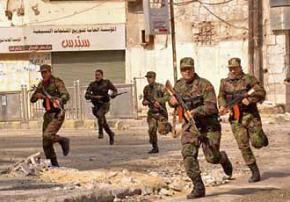Continuing Syria’s struggle for freedom
The Syrian revolution against the dictator Bashar al-Assad is now three-and-a-half years old, and it must confront a challenge from two sides--the repression and military assaults of the Assad regime and the violence of ultra-reactionary fundamentalist groups such as the Islamic State in Iraq and Syria, which are opposed to the democratic goals of the revolution. This statement circulated at the website asks for badly needed solidarity during the struggles ahead.
AS SYRIANS mark the first anniversary of the Assad regime's chemical attacks on Ghouta, which caused the death of several hundred people, we the undersigned stand in solidarity with the millions of Syrians who have struggled for dignity and freedom since March 2011. We call on the people of the world to act in support of the revolution and its goals, demanding the immediate end of violence and the end of the illegitimate Assad regime.
On the anniversary of the attack, August 21, we call on supporters of the Syrian Revolution, and of the region-wide and global uprisings for freedom, dignity and social justice, to organize events to denounce the atrocities, misinformation, lies and shamed silences, and to show solidarity, both political and material, with the ongoing efforts of grassroots Syrians.
Syrian revolutionaries have continued to struggle for freedom despite the many obstacles they face. To kill the revolution, the Syrian regime pursued four strategies: 1) militarization of the revolt through a six-month-long campaign of violent repression of peaceful protests; 2) Islamization of the uprising by targeting secular groups and empowering jihadists; 3) sectarianization of the conflict through recruitment of an increasing number of Shia fighters from abroad, coupled with the targeting of Sunni areas; and 4) internationalization of the war by inviting Iran and Russia to play a central role. At the same time, countries such as the United States, Saudi Arabia and Qatar backed reactionary groups to undermine the popular revolution.

The case of the "Douma 4" also shows that Syrian revolutionaries are fighting on two fronts. Four brave activists working for the Violations Documentation Center were kidnapped in December 2013 by unknown masked armed men believed to be from Islamist groups. These activists were targeted because they consistently spoke out against all forms of tyranny and human rights abuses regardless of the perpetrator. Their kidnapping is a reminder that the Syrian revolution is not only against the Assad dictatorship, but also increasingly against reactionary and opportunist groups that oppose the objectives of the revolution: democracy, social justice and an end to sectarianism.
The first anniversary of the chemical attacks is an occasion to reaffirm the importance of the revolutionary process, not only in Syria, but also in the entire Arab World. The Syrian struggle against dictatorship, global jihadism and imperialism, from whichever quarter it comes, should not be viewed as local or even regional. It forms part of an insurrectionary moment in which the whole world has become the battlefield.
The new developments in Iraq and the resumed war on Gaza have shown that the fate of the Syrian revolution is connected to the situation in the entire region. The struggle of Syrians for dignity, freedom, and self-determination cannot be delinked from the historic rebellion against Zionism, the Egyptian struggles against military despotism, the Bahraini uprising against dictatorship, the Kurdish struggle for self-determination, the Zapatista and other indigenous populations' resistance against racism and neoliberalism, or the massive workers' rebellions on every continent against crisis-driven austerity demands.
The Syrian revolution is at a crossroads, and Syrian revolutionaries are in desperate need of support as they fight on several fronts. A victory for the various counterrevolutions would make permanent the largest ethnic cleansing of our century, leave the country in ruins, and critically destabilize the region and the world. A victory for the revolution, however, would unleash long-repressed social and political aspirations throughout the Arab world and beyond.
First published at the Syrian Revolution Support Bases website.


